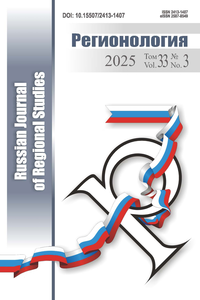O. B. YAROSH, I. F. ZINOVIEV, F. V. ZINOVIEV. FUNCTIONING OF FREE ECONOMIC ZONES IN THE REPUBLIC OF CRIMEA: A RETROSPECTIVE VIEW AND A CONTEMPORARY DICHOTOMY
UDC 332.122(477.75)
O. B. YAROSH, I. F. ZINOVIEV, F. V. ZINOVIEV. FUNCTIONING OF FREE ECONOMIC ZONES IN THE REPUBLIC OF CRIMEA: A RETROSPECTIVE VIEW AND A CONTEMPORARY DICHOTOMY
Keywords: region; Republic of Crimea; free economic zone; regulatory enactment; foreign investors
Introduction: for the last 20 years, various types of free economic zones have functioned in the Republic of Crimea. A study on the assessment of their effectiveness is important for identification of the key development challenges in the region taking into account its unique geopolitical and geo-economic position.
Materials and Methods: the study was based on the materials of analytical reports, laws, statistics on the development of the special experimental economic zone of Sivash and the special economic zone of the Port of Crimea; the results of the evaluation carried out by the authors are also presented. The research methods are: analysis, synthesis and generalization. The methodological apparatus of the research is a combination of the basic methods of research: the comparative-logical, normative and retrospective approaches, structural and dynamic data analysis.
Results: the paper summarizes the legislative base for free economic zones on the basis of which a comparison of the types of free economic zones singled out by different regulations is made. The history of the special experimental economic zone of Sivash and the special economic zone of the Port of Crimea were studied. Based on the study of the principles of existence of free economic zones on the peninsula and the historical parallels, the basic problems that prevent their effective development were identified. Branch specialization of individual economic zones of Crimea is recommended, which can be the basis for elaboration and refinement of strategies for the development of free economic zones in Crimea in the future.
Discussion and Conclusions: in the context of institutional transition of Crimean economy from Ukrainian to Russian legislative environment, currently, it is too early to judge on the effectiveness of functioning of the free economic zones on the territory of the Republic of Crimea. Crimea has great prospects for the development of its economic potential; however, the barriers the free economic zones have been facing should be removed.
REFERENCES
1. Korobova O.V., Naumova N.V. [History of making free economic areas in Russia: problems and prospects]. Social’no-jekonomicheskie javlenija i processy = Social and economic phenomena and processes. 2010; 6:92—96.
Available from: http://cyberleninka.ru/article/n/istoriya-sozdaniya-svobodnyh-ekonomiche... (accessed 12.12.2016). (In Russ.)
2. Mamutov R.M. [Free economic zone and its role in sustainable development of a region (the case study of the Republic of Crimea)].Aktual’nye problemy gumanitarnyh i estestvennyh nauk = Topical issues in the humanities and natural sciences. 2017; 4-2:27—32. Available from: http://publikacia.net/archive/2017/4/2/8 (accessed 20.01.2017). (In Russ.)
3. Pavlov P.V., Tkacheva L.V. [Conceptual model of investment activities development in the Republic of Crimea on the base of a free economic zone]. Administrativnoe i municipal’noe pravo = Administrative and municipal law. 2016; 4:348—358. (In Russ.). DOI: 10.7256/1999-2807.2016.4.16931
4. Rostenko A.O. [Problems of development of free economic zones in the Republic of Crimea and the way of their decision]. Gosudarstvennoe i municipal’noe upravlenie. Uchenye zapiski SKAGS = Public and Municipal Administration. Scientific notes SKAGS. 2016; 4:275—279. Available from: http://upravlenie.uriu.ranepa.ru/2016/12/20/problemy-razvitiya-svobodnyx... (accessed 20.01.2017). (In Russ.)
5. Butkevich O.V. [The legal status of member of the free economic zone in the territory of the Republic of Crimea and the city of Sevastopol]. Uchenye zapiski Krymskogo federal’nogo universiteta imeni V.I. Vernadskogo. Juridicheskie nauki = Scientific Notes of V. I. Vernadsky Crimean Federal University. Juridical science. 2016; 2:190—197. Available from: https://e.lanbook.com/reader/journalArticle/338132/#1 (accessed 20.01.2017). (In Russ.)
6. Selyutin A. [Free economic zone of Crimea: the nuances of the operation]. Jurist&Zakon = Yurist&Zakon. 2014; 40. Available from: http://uz.ligazakon.ua/magazine_article/EA007187 (accessed 25.01.2017). (In Russ.)
Contribution of the authors:
Olga B. Yarosh — preparation of the initial text and subsequent revision, structuring and analyzing the data, determination of the research methodology.
Igor F. Zinoviev — the idea, collection of materials on the research topic.
Felix V. Zinoviev — study of the history of creation of the free economic zones.
About the authors:
Olga B. Yarosh, Doctor of Economic Sciences, Professor at the Department of Marketing, Trade and Customs Affairs, Institute of Economics and Administration, Vernadsky Crimean Federal University (21/4 Sevastopolskaya St., Simferopol, 295015, Russia) (e-mail: yarosh.tnu@gmail.com). ORCID: http://orcid.org/0000-0002-1288-4582. Researcher ID: A-9439-2017
Igor F. Zinoviev, Doctor of Economic Sciences, Professor at the Department of Marketing, Trade and Customs Affairs, Institute of Economics and Administration, Vernadsky Crimean Federal University (21/4 Sevastopolskaya St.,
Simferopol, 295015, Russia) (e-mail: izinovjev@gmail.com). ORCID: http://orcid.org/0000-0002-1941-3994. Researcher ID: S-2030-2016
Felix V. Zinoviev, Doctor of Economic Sciences, Professor at the Department of Personnel Administration and Labor Economics, Institute of Economics and Administration, Vernadsky Crimean Federal
University (21/4 Sevastopolskaya St., Simferopol, 295015, Russia) (e-mail: izinovjev@gmail.com). ORCID: http://orcid.org/0000-0001-7281-7966
For citation: Yarosh O.B., Zinoviev I.F., Zinoviev F.V. [Functioning of Free Economic Zones in the Republic of Crimea: a Retrospective View and a Contemporary Dichotomy]. REGIONOLOGIYA = REGIONOLOGY. 2017; 2(25):217—230.

All the materials of the "REGIONOLOGY" journal are available under Creative Commons «Attribution» 4.0
















